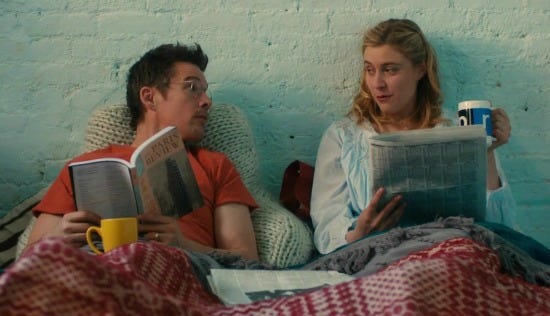Maggie's Plan

About 25 years ago Vice President Dan Quayle caused a stink when he criticized Murphy Brown’s decision to have a baby without getting married, or even lock down a permanent male partner (beyond providing the requisite genetic material). The controversy seems almost quaint today, given society’s rapidly changing mores on what constitutes a proper family (not to mention that Murphy was a fictional TV character).
I thought of this while watching “Maggie’s Plan” because the film serves as the unwitting antithesis of Quayle’s argument. Greta Gerwig plays the titular young woman whose plan to go the single mother route is derailed when she falls in love with a married man, and suddenly finds herself thrust into stewardship of an entire family.
With all the heartbreak and pain she suffers – and causes – it becomes pretty clear by the end that staying single would’ve been the best route to happiness for everyone involved.
The film is written and directed by Rebecca Miller, her fifth feature film over the past two decades. It’s a smart and wry exploration of yet another fully fleshed Gerwig character, and also provides some interesting thoughts on the ever-brewing Mommy Wars.
Maggie is in her early 30s, settled and accomplished as an administrator in the arts program of a New York City college that remains unnamed. (It’s obviously NYU, my alma mater, as evidenced by the locations, especially Washington Square Park; I assume there was a legal reason for remaining coy.)
She’s awesome at most everything, except romance, which is why as the story opens she’s decided to get pregnant using a donor. The male half of her best friend couple, Tony (Bill Hader) and Felicia (Maya Rudolph), offers his sperm, but she’s decided to obtain it from some guy from college – whose name is Guy (Travis Fimmel) – who used to be a promising mathematician but is now a crunchy type selling organic pickles.
Meanwhile, Maggie falls hard for John (Ethan Hawke), a slightly older adjunct professor who’s married with two kids. He’s a rock star in his field, fictocritical anthropology, which basically means he can write about whatever wants and receive an academic stipend for it. Currently he’s trying to write a novel, and escape the clutches of his controlling wife, Georgette.
Just as Maggie is about to culminate the, uh, transaction with Guy, John shows up on her doorstep and professes his love. Flash to 18 months later, and now she is ensconced as the mother of an adorable little girl, as well as playing den mother to John, still working on that novel, as well as his kids. Mina Sundwall plays the knowing, critical teenager.
Georgette turns up, played by Julianne Moore, after having written a book about the dissolution of her marriage, Maggie seeks her out, and the two spark up an unlikely friendship. She’s a strange, cold woman of vague Nordic background, also an academic, who tries to dominate every interaction she has. Moore plays her rather broadly, which is how Georgette is written, but the performance could’ve benefited from more shading.
Maggie realizes that, behind her veil of Valkyrie-like power, Georgette is vulnerable and still loves John. This also forces Maggie to admit that she is miserable with him. So she hatches a scheme to get her husband to leave her for his ex-wife.
Hawke is terrific as John, a generally decent guy whose worst instincts come out when he’s allowed to lean on someone else for everything, instead of being the lean-ee.
Ultimately it’s Gerwig’s show, though, and she continues to demonstrate why she’s one of the best actresses of her generation. Maggie may be just as fictional as Murphy Brown was, but this movie gives us a funny, nuanced look at the choices and expectations Millennial women face.



